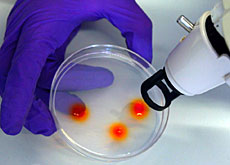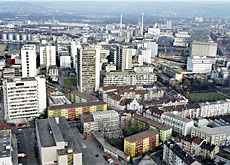Biotech industry charms investors

Despite black clouds hovering over global stock markets, the long-term financial future of the Swiss biotechnology sector remains bright, say industry experts.
Executives from the biotech and pharmaceutical industries joined investors and researchers in Geneva on Tuesday for the start of the seventh annual BioData conference in Geneva.
The regional two-day event, the largest of its kind in Switzerland, provides a unique opportunity for young, innovative start-ups from the Lake Geneva and Franco-Swiss Rhône Alps regions to present their projects which might lead to longer-term partnerships, funding agreements and scientific cooperation.
“Swiss biotech is by far the most advanced and mature biotech sector in Europe. BioData therefore represents an important forum for the industry,” Frankfurt-based investor, Kai Brünig, told swissinfo.
“It’s an important meeting place for the Swiss life sciences sector and essential for the economies of the Lake Geneva and Rhône Alps regions,” Pierre-François Unger, canton Geneva’s minister in charge of economy and health, told the 350 participants.
According to the State Secretariat for Economic Affairs (Seco), with 137 biotech companies and 81 biotech suppliers, Switzerland boasts the world’s highest per capita biotech density.
Bright long-term future
As global stock markets experienced a second day of turbulence on Tuesday, amid fears of a worldwide economic slowdown, biotech investors and industry experts in Geneva tried to calm participants’ nerves.
“While the short-term is going to be tough, the long-term is bright for the sector,” said Ulrich Kinzel, director at Nomura Code Securities.
“Fundamentally the biotech sector should be optimistic about the future, but there’s no question that we are in a difficult market environment right now,” agreed Simon Moroney, CEO of biotech firm Morphosys, which recently signed a $600 million (SFr660 million) deal with Swiss pharmaceuticals giant Novartis.
“We shouldn’t forget that the pharmaceutical industry is very powerful and has extremely deep pockets.”
Kinzel added: “There are lots of bargains in the biotech sector; the bottom clearly has still not been established. In the future we will see rich licensing deals by big pharmas, there will be more biotech mergers and we shouldn’t forget that new markets are developing such as in central and eastern Europe, Russia and Asia.”
The problem, according to the experts, is that anyone wanting to invest in biotech needs patience to “hold out until the markets recover”.
This is why other areas of life sciences, such as medical technology, have been a recent focus for investors, BioData chairman Hervé de Kergrohen told swissinfo.
“Investors want to balance their portfolios between biotech and medtech [medical technology]. Medtech generates quicker exits and a less risky bet, while biotech requires a much longer horizon and bigger investment sums,” he explained.
Helping hand
A large part of the early success of young biotech start-ups is also down to regional synergies and a helping-hand from the right people. Since 2001, BioData has been collaborating with the Lake Geneva life sciences cluster BioAlps.
“This year we are going to support a dozen new start-ups from the region such as Leman Cardiovascular, ArisGen, DiagnoSuisse and Med Discovery,” said Lionel Eperon, BioAlps’s president.
But for the region to keep its competitive edge, private banking and business angels should wake up and participate at the early stages of biotech companies such as Actelion, Addex and Speedel, added de Kergrohen.
“If they do that, this part of the world could be even more successful in the life sciences sector,” he said.
swissinfo, Simon Bradley in Geneva
In 2006 Switzerland was ranked sixth in Europe and tenth worldwide since 1998 in terms of the number of biotech companies.
According to the State Secretariat for Economic Affairs (Seco), the Swiss biotech sector generated a turnover of more than SFr6 billion in 2006 and had a workforce of 14,300.
Half of all Swiss biotech companies were founded before 1997.
Around one-third of the total market capitalisation on the SWX Swiss Exchange, or approximately SFr400 billion, is attributable to life sciences, making it the largest peer group of its kind in Europe.
Geographically the majority of these companies are located close to Lake Geneva or around Basel, Zurich or in canton Ticino.
All four areas benefit from the proximity of universities and biotech incubators.
According to the Swiss Biotech 2007 report, Switzerland has 218 biotech companies.
Nine companies rank among the globally active “players”.
There are around 20 medium-sized companies with 50-100 employees.
The remaining companies have fewer than 50 employees.
85% of the 137 Swiss biotech developers are engaged in “red” biotechnology (human and animal medicine).
7% in the area of environmental protection and industry.
8% in the agricultural and feedstuffs sector.

In compliance with the JTI standards
More: SWI swissinfo.ch certified by the Journalism Trust Initiative












You can find an overview of ongoing debates with our journalists here . Please join us!
If you want to start a conversation about a topic raised in this article or want to report factual errors, email us at english@swissinfo.ch.